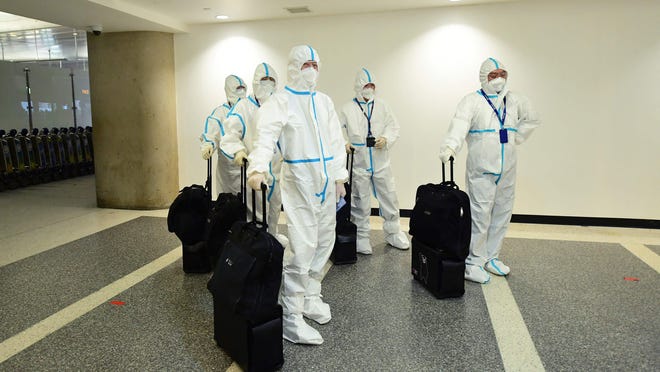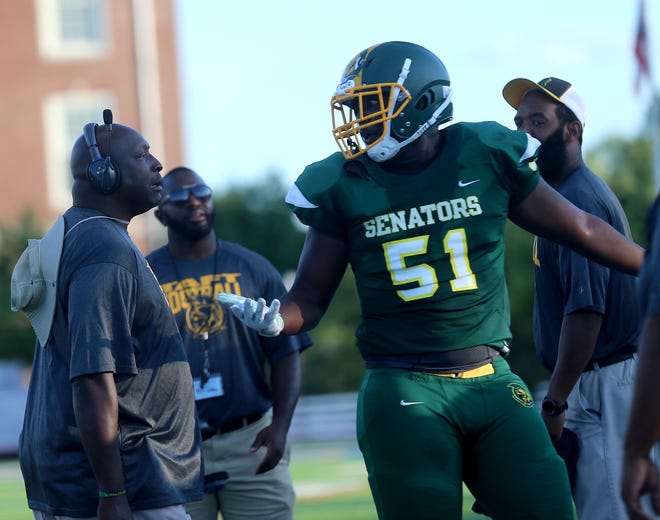
More kids are being hospitalized with the coronavirus, but some experts say the omicron variant does not appear to be more severe in kids than previous strands. Instead, they blame the explosion in all cases and the delay in vaccination for young people since vaccines for them were released well after adults began getting jabs.
The Policylab at Children's Hospital of Philadelphia reported in a blog post last week that nationwide there were 1.1 overall hospitalizations per 100,000 children – low compared to a typical flu season that can reach three to five patients per 100,000 children. Only Ohio and Missouri had a pediatric census exceeding three patients per 100,000 children, the Policylab reported.
The blog post added that the numbers will need to be closely monitored given omicron's surge and an uptick in hospitalization numbers in all regions except the West.
“The important story to tell here is that severity is way down and the risk for significant severe disease seems to be lower,” Dr. David Rubin, a researcher at Children’s Hospital of Philadelphia, told The New York Times.
Also in the news:
►National hospitalizations are rising in about half the states – and some are rising with alarming speed. Alabama, Florida, Georgia, Hawaii, Louisiana, Michigan, New Jersey, New York and South Carolina all rose more than 20% week-over-week. Louisiana admissions are up 107.5% week over week.
►The world saw more than 10 cases reported every second over the seven-day period that ended Tuesday. That's a new record.
►An Australian lab said it has sent hundreds of patients the wrong COVID test results over the last few days, citing a "major increase in volume of tests" combined with a "simple data processing error." Almost 900 people were told they tested negative when they actually tested positive, Sydpath said in a statement.
►The Holiday Bowl became the fifth college football bowl game to be canceled because of COVID-19, the announcement coming hours before Tuesday night's scheduled contest. The Arizona Bowl, Hawaii Bowl, Fenway Bowl and Military Bowl all have also been canceled.
► The CDC now says it erred last week when it said more than 70% of U.S. coronavirus cases in the week ending Dec. 18 were the omicron variant. Turns out the number was more like 22%. But the rate of omicron is rising fast – for the week ending Christmas Day the number was almost 60%.
►On the heels of the CDC’s new guidelines that have shortened the window of isolation for individuals who have tested positive for COVID-19, the NFL and NBA shortened the amount of time that team personnel will have to quarantine.
📈Today's numbers: The U.S. has recorded more than 53.1 million confirmed COVID-19 cases and more than 820,000 deaths, according to Johns Hopkins University data. Global totals: More than 282.8 million cases and 5.4 million deaths. More than 205 million Americans – 61.9% – are fully vaccinated, according to the CDC.
📘 What we're reading: Omicron could force many workers who test positive to quarantine under federal mandate, intensifying labor shortages.
Keep refreshing this page for the latest news. Want more? Sign up for USA TODAY's free Coronavirus Watch newsletter to receive updates directly to your inbox and join our Facebook group.
Aaron Rodgers blasts "two-class" vaccination system in NFL
Green Bay Packers superstar quarterback Aaron Rodgers sounded off on the NFL's COVID protocols on Tuesday, saying the league has created a "two-class system" of the vaccinated vs. the unvaccinated. Rodgers called science "propaganda" if it can't be questioned. Rodgers, speaking on "The Pat McAfee Show," is not vaccinated and tested positive earlier this month. He said he was symptomatic for about 48 hours. The NFL has tighter restrictions on unvaccinated players, but Rodgers will essentially be exempt for 90 days since he has recovered from the coronavirus and thus has natural antibodies.
"What I don't understand, though, it makes no sense to me to continue to spread this narrative that nonvaccinated players are more dangerous or (are) these superspreaders, which hasn't been proven to be true," Rodgers said. "I don't understand this two-class system that exists in our league."
– Christopher Kuhagen, Packers News
US record 1.86 million infections reported in week ending Tuesday
The U.S. easily shattered a COVID-19 case count record Tuesday, and has begun averaging more than 3 cases every second for the first time, Johns Hopkins University data shows. The country reported some 1.86 million cases in the seven-day period ending Tuesday, significantly above the record of 1.76 million set the week ending Jan. 11. America reported more than half a million cases on Monday alone, followed by more than a third of a million cases on Tuesday. And those counts could be artificially low because of disruptions from Christmas.
Case counts are up 75% from just a week earlier. America hasn't seen that kind of increase during a surge since April 2020. At this pace the United States reports about 265,000 cases per day. Johns Hopkins University data shows that number is worse than more than 100 countries have reported during the entire pandemic.
– Mike Stucka
Oklahoma National Guard members must be vaccinated, judge rules
A federal judge in Oklahoma City has rejected Oklahoma’s request to block the federal COVID-19 vaccine mandate for National Guard members. Judge Stephen Friot, however, urged the Biden administration to give Guard members time to comply before taking action that could end military careers, saying non-compliant members "did not have the benefit of well-informed leadership."
Gov. Kevin Stitt has argued that he is the commander in chief of National Guard members when they are on state duty and that he can shield them from the federal vaccination mandate. Stitt was the first governor known to contract COVID-19 when he experienced mild symptoms last summer.
"The court is required to decide this case on the basis of federal law, not common sense," Friot said. "But, either way, the result would be the same. The claims asserted by the governor and his co-plaintiffs are without merit."
– Chris Casteel and Nolan Clay, Oklahoman
2,000 flights already imperiled Wednesday as airline woes continue
More than 2,000 Wednesday flights across the nation were either canceled or delayed before the day barely got started. There are already 805 cancellations and 1,391 delays within, into and out of the U.S. this morning, according to FlightAware, which tracks the status of flights. Thousands of flights have been delayed or canceled over the past several days as airlines grapple with wicked weather across parts of the West and staffing shortages due to the latest surge in coronavirus infections. On Tuesday alone, almost 1,300 flights were canceled and over 7,400 were delayed.
Global infections rise 11% as US cases roar higher
The number of global COVID-19 rose 11% last week compared with the previous week, with the biggest increase in the Americas, the World Health Organization said. The agency said in its weekly epidemiological report that there were nearly 5 million newly reported cases around the world from Dec. 20-26. More than half the increase in cases were in Europe, but the continent saw only a 3% week-to-week increase. Europe had the highest infection rate of any region, with 304.6 new cases per 100,000 residents.
The U.S. saw more than 1.18 million cases, a 34% increase. New cases in the Americas were up 39% to nearly 1.48 million, and the region had the second-highest infection rate with 144.4 new cases per 100,000 residents. Reported new cases in Africa were up 7% to nearly 275,000.
"The overall risk related to the new variant … omicron remains very high," the report said.
FDA says antigen tests may be less effective for omicron
Preliminary study results of some antigen tests using patient samples containing live virus suggest that the tests can detect the omicron variant but may have reduced sensitivity, the Food and Drug Administration says.
Antigen tests – so-called rapid tests – are a maintstay of the pandemic battle because results can be available within minutes. PCR tests are generally more reliable but results can take days to obtain.
"The FDA will continue to collaborate with the National Institutes of Health ... to further evaluate the performance of antigen tests using patient samples with live virus," the FDA said in a statement.
Smithsonian shutters 4 museums until Monday because of surge
The Smithsonian's National Museum of African Art, the National Postal Museum, the Anacostia Community Museum and the National Museum of Asian Art (Freer Gallery of Art and Arthur M. Sackler Gallery) won't open today but are scheduled to reopen Monday, the Washington, D.C.-based agency said. The Smithsonian said in a statement that it has seen an increase in positive COVID cases and quarantines among staff. The closures of these four museums will allow the Smithsonian to reallocate staff and keep all other museums open, the statement said.
The nation's capital has seen the largest increase in COVID-19 cases within the last week – cases have surged by 597% compared to the previous week.
"The Smithsonian strives to keep as many of our museums open to the public as possible without sacrificing the health and safety of our visitors and staff," the statement said.
Some good news on omicron
Two pieces of good news about omicron to take into the new year: It may not be around for long, and people who are fully vaccinated don't need to worry, as long as they have a healthy immune system. Because omicron is so incredibly contagious, medical experts say its peak isn't likely to last long.
It's already burned through South Africa since it was first identified the day before Thanksgiving and cases are falling there. In the week ending Dec. 26, the number of newly diagnosed had dropped nearly 36% from their peak a week earlier, according to a USA TODAY analysis of Johns Hopkins University data.
If the Northeast, which has been battered by COVID-19's omicron variant over the past two weeks, follows the same pattern, it could see falling case rates as soon as mid-January, though since the U.S. is so large, it's likely to take time to move across the country, experts say.
The news is even better for people with the vaccine. Although two shots are not as protective against omicron as they were against previous variants, vaccination and boosting seem to make a big difference in people with a healthy immune system.
– Karen Weintraub
2021 ending with daily infection records
The final days of 2021 will be marked by the U.S. shattering its previous record for daily coronavirus cases. Monday's count of over 500,000 new cases was higher than the nation's previous record of more than 303,000, a USA TODAY analysis of Johns Hopkins University data shows. Washington, D.C., along with seven states reported their worst weeks for new COVID-19 cases on Monday, Johns Hopkins University data shows — even with Christmas interrupting testing. Both Georgia and Washington state eclipsed their previous records for daily COVID-19 cases on Tuesday, and hospitalizations soared in California and North Carolina.
California's COVID-19 hospitalizations have risen 25% in last week, the Los Angeles Times reported, and North Carolina's Department of Health and Human Services reported that almost 22% of tests performed on Sunday were positive.
Tested positive for COVID during the holidays? Here's what to do.
Testing positive for COVID-19 starts a confusing, disruptive and at times frightening process – one that millions of Americans will likely go through in the coming week.
First, you need to isolate. That’s a more intense version of quarantining – it means cutting off contact with other people as much as possible so you reduce the chance of infecting them. This also means forgoing travel, not going to work and even limiting contact with people in your own household who aren't infected.
The CDC says isolating is a necessary step whether you’re vaccinated or unvaccinated, and whether you have symptoms or feel fine.
Everyone who tests positive for COVID-19 should monitor their symptoms. And people who are unvaccinated or at high risk for severe disease should be extra-vigilant for symptoms that might require emergency care. Call your doctor for early treatment options.
How long should you isolate? How long will I be contagious? What if you are in close contact with someone who tested positive? Here’s what you should know about omicron and COVID-19 this holiday season.
Contributing: Mike Stucka, USA TODAY; The Associated Press
Source link







